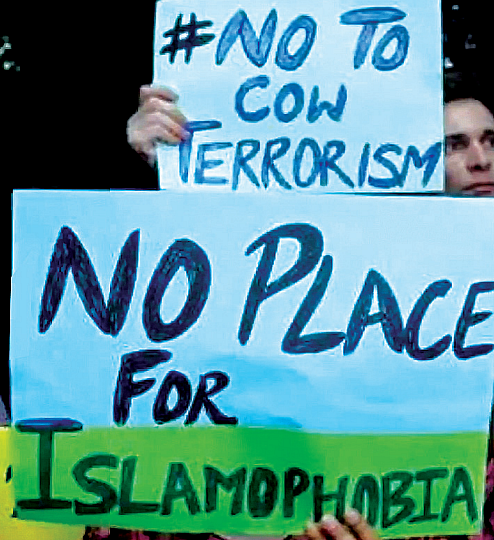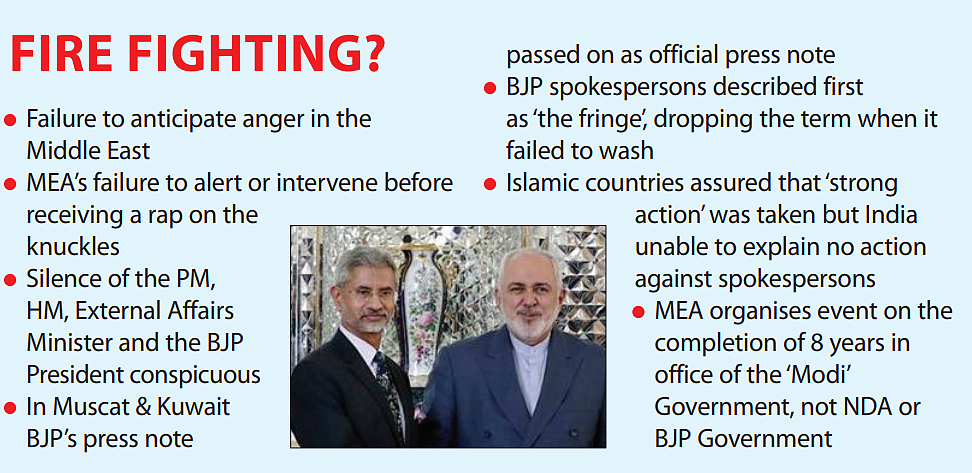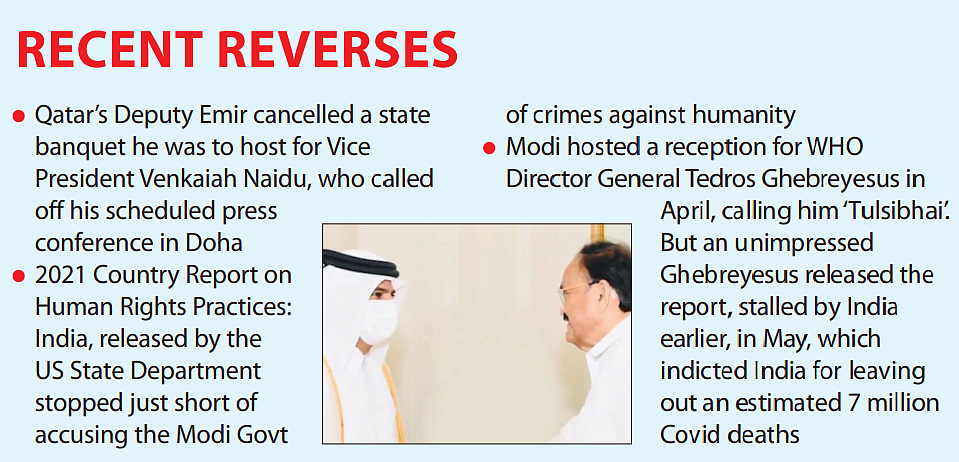Indian diplomacy felled by 'hubris': Strong action taken 'too little, too late'
Rulers, monarchs and governments in Islamic countries would like to conduct business as usual with India. But trust at the level of people will need a lot more effort to be restored

Defence Minister Rajnath Singh had claimed that the Bharatiya Janata Party government had changed the world’s perspective towards India. External Affairs Minister S. Jaishankar, hailed as the face (and voice) of ‘new’ India, asserted it was “not arrogance but confidence” that India displayed on the world stage. Home Minister Amit Shah boasted that world leaders were now consulting the Indian Prime Minister on critical issues.
The messaging was clear. India was flying high on confidence and never had it enjoyed such global respect as it was being accorded now; that India now exudes strength and confidence. Hubris? There was total and stunned silence when on Sunday, June 5, India began to be rapped on the knuckles by Islamic countries on ‘unacceptable’ comments on the Prophet made 10 days ago on Times Now. Hubris had felled India.
The world’s perspective has undoubtedly changed, but the government appears unable to deal with that changed perspective, choosing one standard response: hit back at anyone remotely critical, whether a prime minister (Singapore) or a pop star or a human rights organisation or even a Parliament of another sovereign country, as “ill informed” and their commentary “misplaced” or “malicious” or “unnecessary interference” in the manner of the neighbourhood grouch.
It took a tiny Qatar (Indians constituting 25% of its population and its per capita GDP 25 times higher) for India to get a reality check. Doha summoned Indian Ambassador Deepak Mittal in the middle of a high-level state visit, chided him for a BJP spokesperson’s disgraceful comments and cancelled an official dinner for visiting Indian Vice President Venkaiah Naidu, sending the top Indian leadership to suddenly discover the virtues of the Indian Constitution and India’s secular credentials!
The BJP or the government did not find the bigoted comments of its ‘fringe’ spokespersons worthy of action for over a week, until Qatar told New Delhi that allowing such Islamophobic remarks to continue without punishment would “create a cycle of violence and hate” and alienate the world’s two billion Muslims. For good measure, it demanded an apology from the Indian Governmment. Since then, almost the entire Islamic world; 16 nations, including Indonesia, and entities like the Organisation of Islamic Cooperation (OIC) with 57 member states, have joined in the cascading protests. Even the UN Secretary General has made statements about the need for religious tolerance.
The Narendra Modi government, which followed the Manmohan Singh government’s overtures towards West Asia and invested considerable effort into building those linkages, was buoyed into a sense of unassailable security and self-importance when provocative Hindutva that it indulged did not meet with any real criticism from the Islamic world.
The shock from the protests was, therefore, such that even when images of Modi appeared on dustbins in Kuwait, and reports surfaced of Indian products being removed from stores there, Jaishankar was suddenly conspicuous by his silence. A stunned MEA scrambled to contain the damage and separate the government’s views from those of the party.

Unfortunately, the MEA’s defence appeared far from convincing, especially given its recent record of not accepting any criticism and lashing out at whoever chose to be critical, whether pop star Rihanna (referring to the farmers’ protests last year) or US Secretary of State Tony Blinken.
What intrigued observers and saddened diplomats were the MEA’s choice of words. The draft of a diplomatic communication was once judged by the quality and use of the language. Diplomacy was supposed to be the art of the understatement where what remained unsaid was as important, if not more, as the stated word. Sadly, the need to always hit back, along with the crudeness of the general public discourse in recent years appears to have found its way into the MEA’s official statements.
So, suggestions that all critics have been paid to be critical or have been motivated by Pakistan and terms like “vote bank politics”, “vested interests”, “interference in internal affairs” and “unwarranted and narrow-minded” have entered the Indian diplomatic lexicon.
It was not, however, interference when Modi, in Houston in September 2019 proclaimed, along with former US President Donald Trump, “Ab ki baar Trump Sarkar,” (Trump, once again) and repeated the message, in February 2020, in Ahmedabad.
Just before the storm of Islamic nations’ fury hit the government, the MEA spokesman reacted to the release of the US State Department’s 2021 Report on International Religious Freedom, saying it was “unfortunate” that “vote bank politics” was being practised in international relations and “motivated inputs and biased views” of “ill-informed comments by senior US officials” were accorded precedence over the “naturally pluralistic” Indian society, which “values religious freedom and human rights.”
Also, the language the MEA uses to devalue Pakistan, a sovereign country and member of the United Nations, is an unnecessary display of sanctimonious arrogance.
Until this crisis of confidence and barrage of criticism from a host of Islamic nations, which it cannot wish away, the MEA had actually prepared a presentation to impress upon the rest of the world the uniqueness of India’s democratic model, distinct from Western, anglicised perceptions of parliamentary democracy: democracy with Indian characteristics, as it were. Thus, diplomatic envoys of all countries stationed in India needed to witness the ‘Kumbh mela’, presented as a uniquely ‘democratic’ cultural practice, and officially interact with the BJP, which is anxious for the world to not see it as intolerant and Hinducentric but truly secular.

The term democratic has been literally translated as mass participation, much like India’s electoral process. And what the majority believes, is right and must be carried through.
Having reaped huge dividends from its “soft” power diplomacy in recent decades, particularly through the tenets of non-violence, Mahatma Gandhi, democracy and culture, the Indian government feels it is in an unassailable position as the “Vishwa Guru” or global leader, where nobody has the right to question the government’s credentials.
However, the same BJP crossed an unwritten line when its spokespersons made those derogatory comments and has received what veteran diplomat and former Ambassador Talmiz Ahmad said is “a very clear, strong signal from the Gulf countries”.
Calls for an economic boycott of Indian goods and outraged commentary on social media handles with a large following in West Asia, including of the Grand Mufti of the Oman mosque, have stunned the ruling party into silence and endangered and shamed India and Indians worldwide.
One of the BJP spokespersons has been provided with security. The other one has also asked for security. Several BJP leaders, supporters and its troll army have come out in their support; and contrary to BJP leaders’ belief that what they say or do in India remain confined to the country, they are under increasing scrutiny
As the BJP makes feeble attempts at course correction, it will take all of the MEA’s considerable skill to try and restore India’s image as a truly pluralistic nation which values and nurtures its vast diversity.
(This was first published in National Herald on Sunday)
Follow us on: Facebook, Twitter, Google News, Instagram
Join our official telegram channel (@nationalherald) and stay updated with the latest headlines
